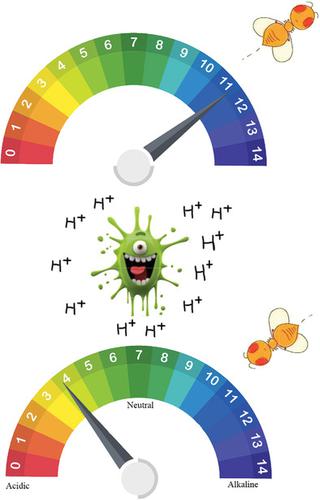当前位置:
X-MOL 学术
›
Insect Sci.
›
论文详情
Our official English website, www.x-mol.net, welcomes your
feedback! (Note: you will need to create a separate account there.)
Symbiotic bacteria attenuate Drosophila oviposition repellence to alkaline through acidification
Insect Science ( IF 2.9 ) Pub Date : 2020-09-18 , DOI: 10.1111/1744-7917.12857 Wei Liu 1, 2 , Jie Wang 1 , Hong-Yu Zhang 1 , Ying-Chun Yang 3 , Ru-Xue Kang 1 , Peng Bai 3 , Hui Fu 1 , Li-Rong Chen 1 , Yan-Ping Gao 1 , Eng King Tan 2
Insect Science ( IF 2.9 ) Pub Date : 2020-09-18 , DOI: 10.1111/1744-7917.12857 Wei Liu 1, 2 , Jie Wang 1 , Hong-Yu Zhang 1 , Ying-Chun Yang 3 , Ru-Xue Kang 1 , Peng Bai 3 , Hui Fu 1 , Li-Rong Chen 1 , Yan-Ping Gao 1 , Eng King Tan 2
Affiliation

|
Metazoans harbor a wealth of symbionts that are ever-changing the environment by taking up resources and/or excreting metabolites. One such common environmental modification is a change in pH. Conventional wisdom holds that symbionts facilitate the survival and production of their hosts in the wild, but this notion lacks empirical evidence. Here, we report that symbiotic bacteria in the genus Enterococcus attenuate the oviposition avoidance of alkaline environments in Drosophila. We studied the effects of alkalinity on oviposition preference for the first time, and found that flies are robustly disinclined to oviposit on alkali-containing substrates. This innate repulsion to alkaline environments is explained, in part, by the fact that alkalinity compromises the health and lifespan of both offspring and parent Drosophila. Enterococcus dramatically diminished or even completely reversed the ovipositional avoidance of alkalinity in Drosophila. Mechanistically, Enterococcus generate abundant lactate during fermentation, which neutralizes the residual alkali in an egg-laying substrate. In conclusion, Enterococcus protects Drosophila from alkali stress by acidifying the ovipositional substrate, and ultimately improves the fitness of the Drosophila population. Our results demonstrate that symbionts are profound factors in the Drosophila ovipositional decision, and extend our understanding of the intimate interactions between Drosophila and their symbionts. This article is protected by copyright. All rights reserved GRAPHICAL ABSTRACT: XXX.
中文翻译:

共生细菌通过酸化将果蝇产卵排斥减弱为碱性
后生动物拥有丰富的共生体,它们通过占用资源和/或排泄代谢物不断改变环境。一种常见的环境改变是改变 pH 值。传统观点认为共生体促进了宿主在野外的生存和生产,但这种观点缺乏经验证据。在这里,我们报告肠球菌属中的共生细菌减弱了果蝇对碱性环境的产卵回避。我们首次研究了碱度对产卵偏好的影响,发现苍蝇强烈不愿在含碱基质上产卵。这种对碱性环境的先天排斥部分是由于碱性会损害后代和亲本果蝇的健康和寿命这一事实。肠球菌显着减少甚至完全逆转了果蝇对碱性的产卵回避。从机制上讲,肠球菌在发酵过程中会产生大量乳酸,从而中和产蛋基质中的残留碱。总之,肠球菌通过酸化产卵底物来保护果蝇免受碱胁迫,并最终提高果蝇种群的适应性。我们的研究结果表明,共生体是果蝇产卵决定的重要因素,并扩展了我们对果蝇与其共生体之间密切相互作用的理解。本文受版权保护。保留所有权利图形摘要:XXX。肠球菌在发酵过程中会产生大量乳酸,从而中和产蛋基质中的残留碱。总之,肠球菌通过酸化产卵底物来保护果蝇免受碱胁迫,并最终提高果蝇种群的适应性。我们的研究结果表明,共生体是果蝇产卵决定的重要因素,并扩展了我们对果蝇与其共生体之间密切相互作用的理解。本文受版权保护。保留所有权利图形摘要:XXX。肠球菌在发酵过程中会产生大量乳酸,从而中和产蛋基质中的残留碱。总之,肠球菌通过酸化产卵底物来保护果蝇免受碱胁迫,并最终提高果蝇种群的适应性。我们的研究结果表明,共生体是果蝇产卵决定的重要因素,并扩展了我们对果蝇与其共生体之间密切相互作用的理解。本文受版权保护。保留所有权利图形摘要:XXX。并最终提高果蝇种群的适应性。我们的研究结果表明,共生体是果蝇产卵决定的重要因素,并扩展了我们对果蝇与其共生体之间密切相互作用的理解。本文受版权保护。保留所有权利图形摘要:XXX。并最终提高果蝇种群的适应性。我们的研究结果表明,共生体是果蝇产卵决定的重要因素,并扩展了我们对果蝇与其共生体之间密切相互作用的理解。本文受版权保护。保留所有权利图形摘要:XXX。
更新日期:2020-09-18
中文翻译:

共生细菌通过酸化将果蝇产卵排斥减弱为碱性
后生动物拥有丰富的共生体,它们通过占用资源和/或排泄代谢物不断改变环境。一种常见的环境改变是改变 pH 值。传统观点认为共生体促进了宿主在野外的生存和生产,但这种观点缺乏经验证据。在这里,我们报告肠球菌属中的共生细菌减弱了果蝇对碱性环境的产卵回避。我们首次研究了碱度对产卵偏好的影响,发现苍蝇强烈不愿在含碱基质上产卵。这种对碱性环境的先天排斥部分是由于碱性会损害后代和亲本果蝇的健康和寿命这一事实。肠球菌显着减少甚至完全逆转了果蝇对碱性的产卵回避。从机制上讲,肠球菌在发酵过程中会产生大量乳酸,从而中和产蛋基质中的残留碱。总之,肠球菌通过酸化产卵底物来保护果蝇免受碱胁迫,并最终提高果蝇种群的适应性。我们的研究结果表明,共生体是果蝇产卵决定的重要因素,并扩展了我们对果蝇与其共生体之间密切相互作用的理解。本文受版权保护。保留所有权利图形摘要:XXX。肠球菌在发酵过程中会产生大量乳酸,从而中和产蛋基质中的残留碱。总之,肠球菌通过酸化产卵底物来保护果蝇免受碱胁迫,并最终提高果蝇种群的适应性。我们的研究结果表明,共生体是果蝇产卵决定的重要因素,并扩展了我们对果蝇与其共生体之间密切相互作用的理解。本文受版权保护。保留所有权利图形摘要:XXX。肠球菌在发酵过程中会产生大量乳酸,从而中和产蛋基质中的残留碱。总之,肠球菌通过酸化产卵底物来保护果蝇免受碱胁迫,并最终提高果蝇种群的适应性。我们的研究结果表明,共生体是果蝇产卵决定的重要因素,并扩展了我们对果蝇与其共生体之间密切相互作用的理解。本文受版权保护。保留所有权利图形摘要:XXX。并最终提高果蝇种群的适应性。我们的研究结果表明,共生体是果蝇产卵决定的重要因素,并扩展了我们对果蝇与其共生体之间密切相互作用的理解。本文受版权保护。保留所有权利图形摘要:XXX。并最终提高果蝇种群的适应性。我们的研究结果表明,共生体是果蝇产卵决定的重要因素,并扩展了我们对果蝇与其共生体之间密切相互作用的理解。本文受版权保护。保留所有权利图形摘要:XXX。











































 京公网安备 11010802027423号
京公网安备 11010802027423号